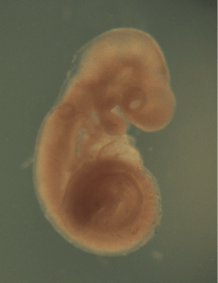For a long time, scientists have wondered what distinguishes humans and apes. Once the human and chimp genomes were deciphered about a decade ago, scientists could discover the genetic roots of the human brain size, bipedalism, and the varied diet that makes our species quite successful. Yet, the importance of genes in human evolution is rarely explicitly demonstrated. In the words of Grey Wray, an evolutionary biologist at Duke University, “you could imagine [their roles], but they were just sort of ‘just so’ stories” (1).

Scientists have successfully used HARE5, an enhancer that functions in human cortex development, to boost the size of mouse brains.
Source: https://www.tcd.ie/Zoology/research/WntPathway/wnt2b.php
Wray is interested in DNA segments called enhancers, which control the activity of genes nearby. Assisted by a Duke graduate student Lomax Boyd, Wray scanned the genomic databases and searched the scientific literature for enhancers that differ between humans and chimps and are located near genes that play an important role in the brain. They inserted each of these enhancers into embryonic mice to test whether they affected gene function.
Wray and Boyd took particular interest in HARE5, the most active enhancer in the cortex of the brain. They made minigenes containing either the chimp or human version of the enhancer linked to a porter gene that turned on the developing mouse embryo wherever the enhancer turned on the gene. The embryos carrying the human version of the enhancer developed brains that turned blue sooner and over a broader expanse.
Researchers determined that HARE5 likely controls a gene called Frizzled 8, which is part of a molecular pathway important in brain development. Further studies suggest that human version of the enhancer causes developing nerve cells to divide more frequently, providing more cells for the cortex. Hence, embryos carrying human HARE5 have brains that are 12% larger than the embryos with the chimp enhancer.
Researchers worry that the observed effects of HARE5 are due to chance, so more research needs to be done. However, scientists do agree that the Duke team has made impressive progress, and many are optimistic about future discoveries.
Source:
1. Pennisi E (19 Feb 2015) Human DNA enlarges mouse brains. Science. Retrieved from http://news.sciencemag.org/biology/2015/02/human-dna-enlarges-mouse-brains?rss=1

Leave a Reply